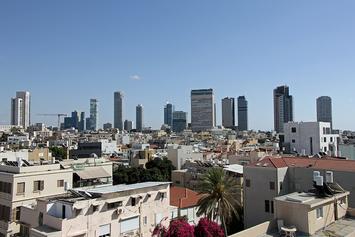
Jet fighters, smart bombs, terrorism and ethnic cleansing have not exactly improved the Middle East. Yet the perennial world trouble spot is not without resources — an increasingly educated population, massive energy resources and ample capital — but still suffers economically, with the world’s worst unemployment rates.
Perhaps the way out of the region’s dilemma lies in allowing entrepreneurs to lead the region out of its current chaos. What warfare has failed to do, perhaps capitalism could accomplish, turning a violence prone disaster area into a marketplace success story.
Wherever they settle, people from the region shine as entrepreneurs. In the United States, Middle Easterners traditionally boast among the highest start-up rates. Go anywhere the Mideast diaspora settles — Atlantic Avenue Brooklyn, Edgware Road in London, the Detroit suburbs, the San Fernando Valley, Anaheim and even parts of Germany — and grassroots capitalism flourishes.
The Mideast’s capitalist legacy
The Middle East boasts a proud legacy of capitalist innovation, notes author Nima Sanandaji in his important new book, “The Birthplace of Capitalism: The Middle East.” He traces the world’s first capital markets, banks, artisanal industries and long-distance traders to this region, including in the first great cosmopolitan cities.
In classical times, Greek and Roman aristocrats held their noses about trade while Syrian and Jewish traders played dominant roles in imperial commerce. They continued this role even after the empire fell and well into the Middle Ages. “Iranians, Arabs, Turks, Jews, Kurds, Armenians and the myriad of people who inhabit the Middle East have widely different cultures,” Sanandaji notes. “ Yet they are all dealers and hagglers, with market exchange almost encoded into their cultural DNA.”
Islam, the region’s dominant religion, he adds, was forged by Mohammed, a man from the merchant classes. It does not share a theological ambivalence about trade so common in other faiths.
The Israeli example
Israel, founded largely as a socialist state, long embraced a communalist world-view, epitomized by the kibbutzim. Yet today there is arguably no more capitalist and innovative place on earth than Israel’s secular capital, Tel Aviv.
Of course, religious zealots still flourish, especially in Jerusalem and the settlement towns in the occupied territories. But largely secular innovators have made Tel Aviv, according to the Start-up Genome project, the sixth-richest entrepreneurial region in the world, ahead of Berlin, Los Angeles, Shanghai and Seattle.
Like their ancient forebears, Israeli capitalists are outward looking, and internationalist in outlook. Large U.S. tech companies — Google, Microsoft, Intel — invest there to harvest cutting edge technology and there are an estimated 300 research and development centers in the tiny country.
Dubai: The new Arab way
Respect for Israel’s accomplishments is widespread in the region, albeit only privately. One young Emirati from Dubai confessed recently that his dream was to visit Tel Aviv, which he saw as the cutting-edge city of the modern Middle East.
Although not quite a start-up hub like Tel Aviv, Dubai already represents an important regional role model. Its airport is second to none, its hotels, beaches and conference facilities widely attended by visitors from Russia, India and Europe. There are some signs of an emerging start-up scene in tech-related businesses. Modern and remarkably tolerant — as long as you don’t criticize royal authority — Dubai opportunistically seeks to become an enterprising society.
Other cities in the region may be more populous, but only Dubai, in a study done by the Singapore Civil Service College and Chapman University, ranked as the seventh-most important global city in the world, ahead of Beijing, L.A. and the Bay Area. None of the other Middle East capitals outside Israel came close.
A new Middle East?
Unfortunately, some of the countries that once seemed ready to lead this shift, such as Turkey and Egypt, have recently suffered a resurgence in pervasive cronyism. Property rights remain questionable enough to discourage entrepreneurs. Iran boasts a growing community of young technology graduates but protests against a crony-dominated theocracy have not yet succeeded. Beirut, the natural business center of the regions, remains too politically divided to flourish.
Yet there is a clear desire for change. Recently I saw this in Medina — one of Islam’s holiest cities — long off-limits to non-Muslims. Ambitious industrial and technology parks are being built around the city, although the social infrastructure for secularly minded or non-Muslim partners remains woefully insufficient, including restaurants, hotels or living quarters.
Turning cities like Medina and others in Saudi Arabia into thriving, diverse capitalist centers represents the supreme challenge to the vision of Crown Prince Mohammed bin Salman. The heir apparent seems determined to remake the country, with its long mercantile history, into a center of finance and trade. His cities are still a long way from Tel Aviv or Dubai, but the determination to catch up is palpable.
This is an ambition worth encouraging. The region and the world might enjoy a more secure and prosperous future if the region’s leaders started investing less in warfare and more in exploiting the rich veins of capitalist ambition that lie deep in its extraordinary past.
This piece originally appeared in The Orange County Register.
Joel Kotkin is executive editor of NewGeography.com. He is the Roger Hobbs Distinguished Fellow in Urban Studies at Chapman University and executive director of the Houston-based Center for Opportunity Urbanism. His newest book is The Human City: Urbanism for the rest of us. He is also author of The New Class Conflict, The City: A Global History, and The Next Hundred Million: America in 2050. He lives in Orange County, CA.
Photo: Eduard Marmet (Skyline of Tel Aviv) [CC BY-SA 2.0], via Wikimedia Commons












